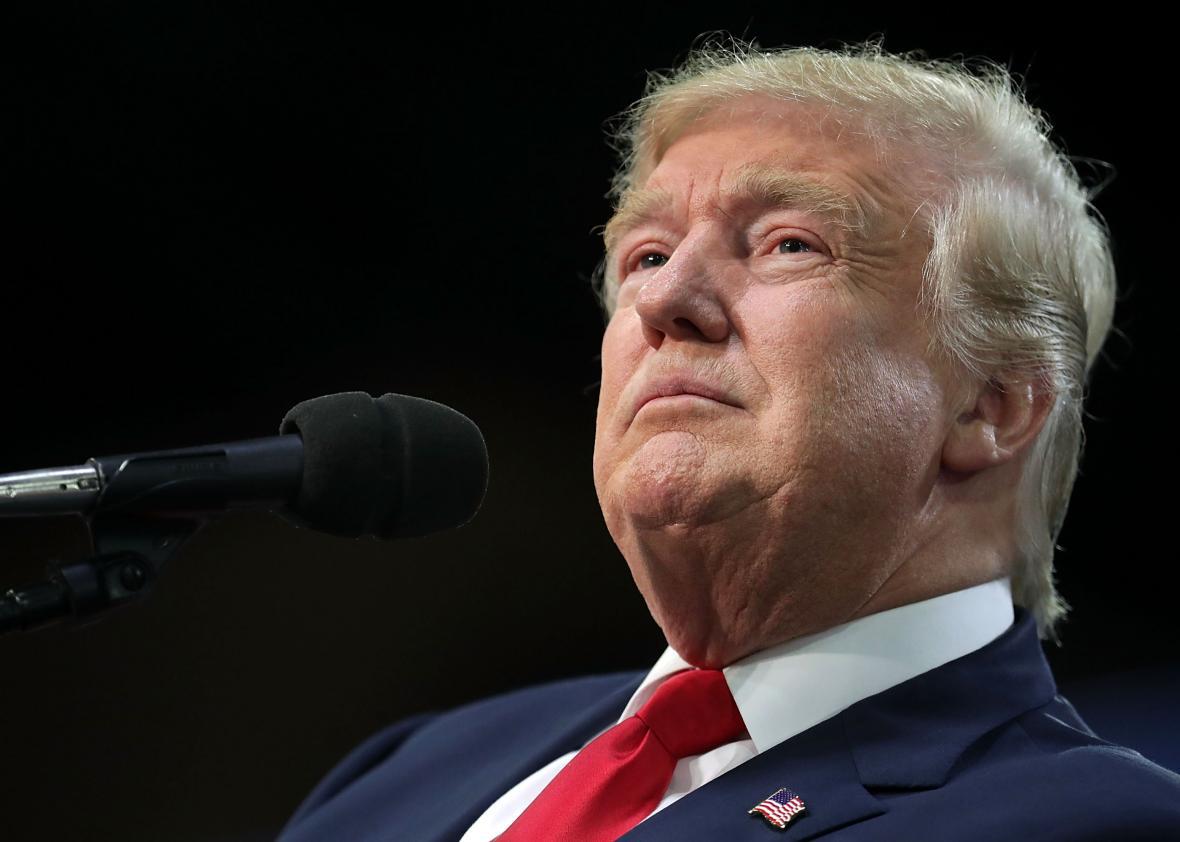As we stumble toward Election Day, three items have dominated news cycles: the now infamous Access Hollywood tape and the dozen women who have come forward to accuse Donald Trump of inappropriately accosting them; Trump’s ongoing insistence that the election is somehow “rigged”; and now the revelation that the FBI has uncovered “new” emails related to its investigation of the personal email server Hillary Clinton used as secretary of state. These issues have eclipsed what would have been, in any normal election year, a major story: With just eight days to go until the election, Trump continues to withhold his tax returns, and his campaign has effectively conceded that he’s not planning to release them. That may no longer seem like a first-order concern, but we also shouldn’t normalize it by losing sight of how extraordinary and troubling Trump’s intransigence on this matter truly is.
The practice of Republican candidates releasing their tax returns began with George Romney in 1968. Gerald Ford released summaries of his returns. Starting with Ronald Regan in 1980, every Republican nominee has released his actual returns, though Mitt Romney dragged his feet and released them late in the process. It appears that Trump will be the first candidate to refuse to release his returns since Richard Nixon.
At first, Trump claimed he could not release his returns because he was under audit. But that doesn’t prevent him from releasing his returns—as the Internal Revenue Service said in February. Even if it did, Trump has plenty of older tax returns that are not under audit that he could release. Interestingly, he’s never produced an audit letter from the IRS, causing some to question whether he really has been under audit. After a number of people, including many Republicans, urged Trump to disclose his returns, his son Donald Trump Jr. floated another reason why he shouldn’t release his returns, one that was at least refreshingly honest but no less troubling. Donald Jr. argued that releasing the returns would detract from his father’s main message. No doubt!
Trump’s failure to release his returns led to a spate of speculation about what he might be hiding. Theories included evidence that he gave little or nothing to charity, the possibility that he paid little or no tax, his use of aggressive or illegal tax shelters, possible connections to the mafia or Russian oligarchs, and evidence that he was far less wealthy and successful than he claimed. Given the parade of horribles that people imagined, many suggested that Trump should disclose to end the wild speculation. Others assumed that he was hiding something even worse. Some even argued that his true ambition was not to be president, but rather to bolster his brand for his own aggrandizement.
Then things got curiouser. First, the Washington Post’s David Fahrenthold uncovered information strongly suggesting that Trump had been operating his private foundation for his own personal benefit, directing his income to the foundation and then using those funds to satisfy his own personal obligations. Seeing Trump’s personal returns would certainly help evaluate Fahrenthold’s claims.
Second, several pages of Trump’s 1995 state tax returns surfaced. They showed that Trump had claimed a $916 million loss, which likely eliminated his tax liability for 18 years. This disclosure raised a host of additional questions, including whether he had really lost nearly $1 billion or whether that figure represented paper losses. Assuming these were business losses, questions arose as to how they ended up on his personal return. Trump and his surrogates claimed that he was a genius who understood the tax code better than any candidate in the history of candidates. Again, seeing Trump’s returns would help voters evaluate these claims.
Many of the reasons Trump should release his returns are specific to Trump. He has repeatedly used the campaign to promote his own business interests, such that it is hard not to wonder whether his policy positions are designed to advance America’s interests or his own. The obvious question that would be answered with the release of his returns would be how much he would benefit from his own tax cut proposals. We might learn important information about other proposals as well. For instance, his campaigned has been dogged by suggestions that his pro-Russia policies may be motivated by close business ties with Russian investors—ties he says don’t exist. Releasing his tax returns could reveal important details of his business dealings and help voters assess these and other similar claims.
Finally, Trump has built his candidacy upon the notion that he is a successful and wealthy businessman who wants to do for America what he has done for himself over the course of his career. Releasing his returns would help us evaluate his claims of success and business and tax acumen.
It’s fairly evident by now why Trump wouldn’t want his returns to be public—as I’ve written several times throughout the election cycle. There’s no reason to think he’ll reverse course and finally release them in the next week. But this goes far beyond Trump. Every major candidate for the past 26 years has released his or her tax returns, and we risk undermining this important tradition if we allow Trump’s refusal to get lost amid his other scandals and outrageous statements or concerns about Clinton’s emails. Just as candidates now release medical records to assure voters that they are fit for office, tax records are critical because they reveal a candidate’s potential conflicts of interest and commitment to honesty and integrity. Trump’s refusal to produce records likely doesn’t make the top-five list of norms he has broken this election cycle, and if he loses, it likely won’t be cited as a key reason for his loss. But we can’t forget it. Rather, we should reaffirm our expectation that all major candidates for the highest office in the land should release their returns—and make clear that those who do not pay a stiff political price.
